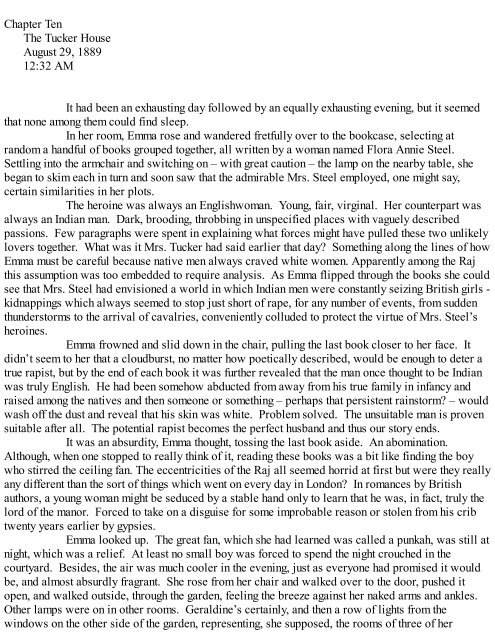You also want an ePaper? Increase the reach of your titles
YUMPU automatically turns print PDFs into web optimized ePapers that Google loves.
Chapter Ten<br />
The Tucker House<br />
August 29, 1889<br />
12:32 AM<br />
It had been an exhausting day followed by an equally exhausting evening, but it seemed<br />
that none among them could find sleep.<br />
In her room, Emma rose and wandered fretfully over to the bookcase, selecting at<br />
random a handful of books grouped together, all written by a woman named Flora Annie Steel.<br />
Settling into the armchair and switching on – with great caution – the lamp on the nearby table, she<br />
began to skim each in turn and soon saw that the admirable Mrs. Steel employed, one might say,<br />
certain similarities in her plots.<br />
The heroine was always an Englishwoman. Young, fair, virginal. Her counterpart was<br />
always an Indian man. Dark, brooding, throbbing in unspecified places with vaguely described<br />
passions. Few paragraphs were spent in explaining what forces might have pulled these two unlikely<br />
lovers together. What was it Mrs. Tucker had said earlier that day? Something along the lines of how<br />
Emma must be careful because native men always craved white women. Apparently among the Raj<br />
this assumption was too embedded to require analysis. As Emma flipped through the books she could<br />
see that Mrs. Steel had envisioned a world in which Indian men were constantly seizing British girls -<br />
kidnappings which always seemed to stop just short of rape, for any number of events, from sudden<br />
thunderstorms to the arrival of cavalries, conveniently colluded to protect the virtue of Mrs. Steel’s<br />
heroines.<br />
Emma frowned and slid down in the chair, pulling the last book closer to her face. It<br />
didn’t seem to her that a cloudburst, no matter how poetically described, would be enough to deter a<br />
true rapist, but by the end of each book it was further revealed that the man once thought to be Indian<br />
was truly English. He had been somehow abducted from away from his true family in infancy and<br />
raised among the natives and then someone or something – perhaps that persistent rainstorm? – would<br />
wash off the dust and reveal that his skin was white. Problem solved. The unsuitable man is proven<br />
suitable after all. The potential rapist becomes the perfect husband and thus our story ends.<br />
It was an absurdity, Emma thought, tossing the last book aside. An abomination.<br />
Although, when one stopped to really think of it, reading these books was a bit like finding the boy<br />
who stirred the ceiling fan. The eccentricities of the Raj all seemed horrid at first but were they really<br />
any different than the sort of things which went on every day in London? In romances by British<br />
authors, a young woman might be seduced by a stable hand only to learn that he was, in fact, truly the<br />
lord of the manor. Forced to take on a disguise for some improbable reason or stolen from his crib<br />
twenty years earlier by gypsies.<br />
Emma looked up. The great fan, which she had learned was called a punkah, was still at<br />
night, which was a relief. At least no small boy was forced to spend the night crouched in the<br />
courtyard. Besides, the air was much cooler in the evening, just as everyone had promised it would<br />
be, and almost absurdly fragrant. She rose from her chair and walked over to the door, pushed it<br />
open, and walked outside, through the garden, feeling the breeze against her naked arms and ankles.<br />
Other lamps were on in other rooms. Geraldine’s certainly, and then a row of lights from the<br />
windows on the other side of the garden, representing, she supposed, the rooms of three of her
















